Written by: Bai Ding & Wu Yue, Geek Web3
When it comes to public goods in the Internet age, Wikipedia may be the most representative case. This world-renowned online encyclopedia was co-founded by Jimmy Wales and Larry Sanger in 2001. It aims to provide a freely accessible knowledge platform through the Internet, "so that everyone can freely access all human knowledge."
Today, Wikipedia has indisputably achieved this goal. With its open editing model of "user-uploaded content", anyone can contribute content online, allowing Wikipedia to gather "think tanks" from all over the world.
As of now, the platform has more than 62 million entries in more than 300 languages, with more than 14 million edits per month. The data volume of the English Wiki alone exceeds 20TB, and the monthly visits are more than 6 billion times, ranking among the top 10 most popular websites in the world. With these data, Wikipedia is worthy of being the benchmark of knowledge base in the Web2 era.
At a time when AI is developing rapidly, the value of Wikipedia is even more difficult to estimate. Computer scientist Jesse Dodge once said that Wikipedia is the largest single source of information for ChatGPT's underlying large language model, and its content may account for 3% to 5% of the data captured by LLM. Nicholas Vincent, a faculty member at Simon Fraser University, even said, "Without Wikipedia, generative artificial intelligence would cease to exist."
What is most surprising is that Wikipedia, which is so large and so successfully operated, is not a commercial private organization. It is even "the world's largest website without commercial advertisements." This sounds incredible because most Internet platforms of similar size rely on advertising fees or burning money to fill holes to make a living. For Web2 public goods with difficult monetization capabilities and generally short life cycles, it is almost impossible to operate on a non-commercial basis and maintain a huge scale to this day.
Katherine Maher, CEO of the Wikimedia Foundation, said in 2021: "If Wikipedia had not been founded in the early 21st century, it would not have been born in today's fragmented and commercialized Internet world."
How did Wikipedia, which is mainly non-profit, achieve its current influence? The secret is worth exploring. With the research interest in public goods, we conducted a brief investigation on Wikipedia. Since this case has a strong enlightenment significance for public goods operators, especially content output platforms, we recommend everyone to read this article. Below we will elaborate on Wikipedia's content output model, cash flow sources and expenditure distribution, and power and financial disputes from multiple angles.
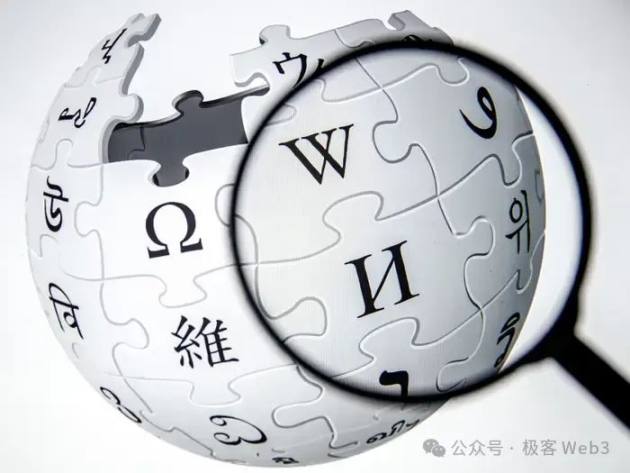
UGC: A revolutionary content generation model
Wikipedia's open editing model can be traced back to its early days. Its predecessor was Nupedia, which aimed to build a high-quality online encyclopedia website. However, Nupedia's editing process was very slow, and uploaded content had to go through multiple levels of review and expert approval, which severely limited the speed of content generation. The project only collected a handful of articles within a year of its establishment in 2000.
In order to improve the efficiency of content production, Larry Sanger, the founder of Nupedia, came up with a new idea and developed a knowledge network system called "Wiki", which allows users to upload content freely and anyone can participate in editing entries. This later became Wikipedia.
From a product perspective, wiki is a knowledge network system. The cost for users to create, modify and publish wiki texts based on the web is much lower than that for HTML texts. At the same time, the wiki system supports community-oriented collaborative writing and provides simple tools to facilitate community communication, which helps share knowledge in a certain field.
In the book "The World Is Flat", the author directly calls the above model "community uploaded content". In more literature, the content editing model introduced by Larry Sanger is called UGC (User-Generated Content), which often has no considerable material incentives behind it and is more driven by interest.
UGC quickly broke the traditional encyclopedia dominated by experts and publishers, and was able to flexibly include non-academic but popular hot events, and thus quickly captured the minds of the majority of users. This bottom-up "crowdsourcing" model allowed Wikipedia's information to quickly extend to all aspects. After it went online in January 2001, Wikipedia quickly surpassed Nupedia, which was closed in 2003. The Encyclopedia Britannica also announced in 2012 that it would stop printing and publishing under the impact of Wikipedia.
Currently, there are still millions of volunteers around the world participating in editing and maintaining content on the Wikipedia platform. There are about 120,000 active editors (those who participate in editing at least once a month), and about 300 editing events occur on the website every minute.

Although UGC has created conditions for the rise of Wikipedia, its side effects are equally obvious. In an open and free editing model, how to ensure the accuracy of the content is an unavoidable pain point. There have been countless cases of falsified or destructive editing of entries on Wikipedia, the most common of which include inserting false information, advertising copy, or politically oriented content. The most famous of these is the "John Seigenthaler entry falsification incident." How to deal with these destructive behaviors is actually an extremely arduous and difficult task to cure.
Wikipedia's current solution is to provide a function to roll back the content of an entry to an older version. Each entry has a history of revisions, and anyone who finds that an entry has been maliciously changed can roll back the entry to an older version.
According to statistics, obvious malicious editing behaviors are easy to detect and remove. According to experimental tests, such error correction behaviors can be triggered in an average of a few minutes. Wikipedia now widely uses bots to correct simple clerical errors or vulgar content, but vandalism that is difficult to detect quickly still requires human intervention.
For issues that require manual human intervention, Wikipedia has developed a three-tiered security system that is implemented in a decentralized manner. First, when malicious editing occurs, the most common way to deal with it is "modify, rollback, and discuss." When user A edits an entry, if user B has doubts, they can roll it back to the old version, and then explain their differences on the discussion page to seek consensus.
Sometimes the disputing parties tend to get stuck in a stalemate, with "edit, rollback, edit, rollback" happening repeatedly, which requires the intervention of higher-authority roles, commonly known as administrators and inspectors.
Administrators have higher authority, such as deleting entries, protecting pages, preventing editing conflicts, and handling complaints. The main task of inspectors is to quickly review and mark the latest published content. They can mark problematic content as "pending review" and report it to administrators or higher-level volunteers.
In addition, administrators can set entries that are prone to malicious modification (such as public figures) to a partially or fully protected state, restricting editing permissions to keep the entry status stable. Administrators also have the right to ban users who maliciously edit entries.
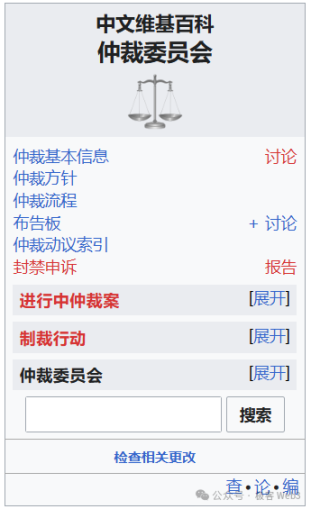
For more complex situations, Wikipedia also has an arbitration committee composed of senior volunteers as a last resort. The committee members are all senior volunteers, and their decisions are based on Wikipedia's editorial policy and community norms to ensure that the content meets neutral and verifiable standards.
In terms of open source content licensing agreements, Wikipedia adopts several Creative Commons licenses, the most important of which is the CC BY-SA 4.0 agreement, which allows users to freely share or adapt content, but two conditions must be met:
1. The original author’s name, source of the work and link must be indicated
2. If the work is adapted, the adapted work must also be released under CC BY-SA 4.0 to facilitate more users to create. In addition to CC BY-SA 4.0, some older content and images are still applicable to the GNU Free Documentation License (GFDL)
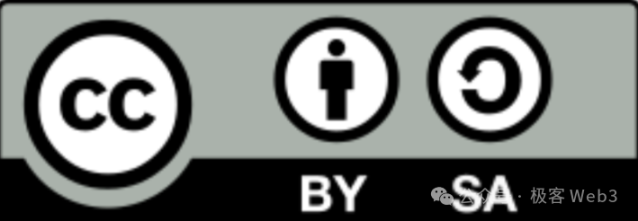
Cash flow analysis: Can the Tower of Babel be supported by donations alone?
Cash flow sources
For large Internet platforms with large scale and many users, how to obtain stable cash flow is the most troublesome problem. Wikipedia, which focuses on non-commercialization, free reading, and neutral values, is almost impossible to monetize by inserting advertisements or membership like commercial platforms such as Twitter and YouTube. In addition, there is no strong private institution behind Wikipedia to provide huge subsidies, so how it obtains cash flow to maintain operations is a question that many people are curious about.
We can take Baidu Encyclopedia as an example. When searching for the term "medical insurance", it is easy to find that Baidu Encyclopedia relies heavily on advertising revenue. This commercial monetization method often leads to biased or false information. For example, the Wei Zexi incident in 2016 was a victim of this model, which eventually prompted the Cyberspace Administration of China and other departments to order relevant Internet platforms to reduce the proportion of commercial promotion.
According to the metric in Vitalik's "income-evil curve", the Wei Zexi incident is a typical case of negative externalities caused by excessive monetization of public goods. In contrast, Wikipedia's non-commercial policy makes it more neutral and retains more positive externalities, but is this model really sustainable?
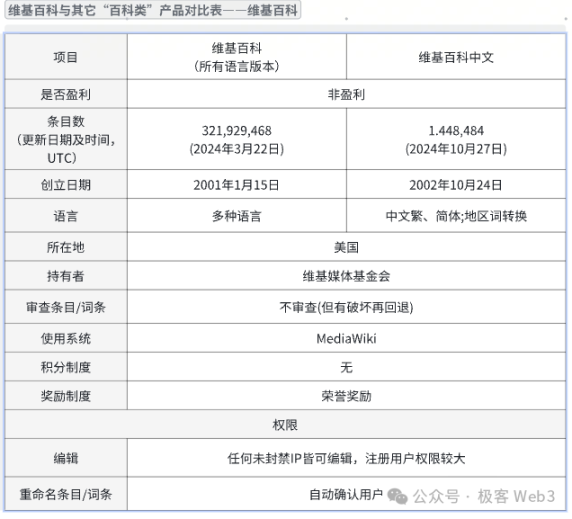
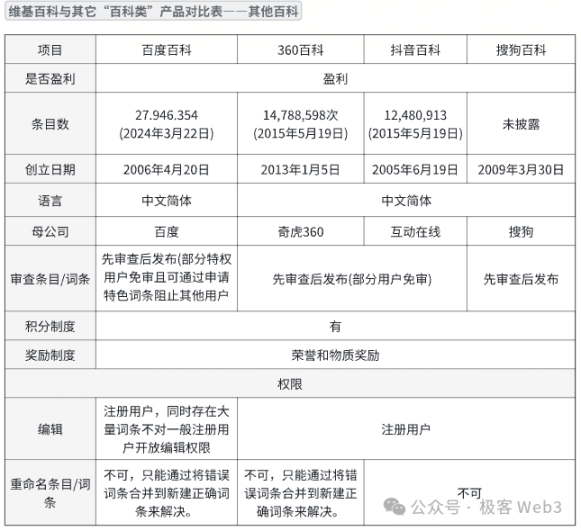
Comparison table between Wikipedia and other "encyclopedia" products
The sustainability of Wikipedia can only be traced back to its sponsoring organization, the Wikimedia Foundation. The foundation was founded in 2003 and is headquartered in San Francisco. It currently has more than 500 employees. Its funding mainly comes from donations and grants. According to its publicly disclosed materials, the Wikimedia Foundation's income sources include the following:
The first is user donations. Every year, the Wikimedia Foundation launches a fundraising campaign to appeal to users around the world to donate to support platform operations. Most of these donations are small, but the number of donors is huge, accounting for a large proportion of the foundation's income. When most users browse Wikipedia, a banner pops up on the screen twice a year, asking users to donate to keep the platform running.
According to the Wikimedia Foundation's data for the 2022-2023 fiscal year, the foundation's total revenue reached $180 million, of which small user donations accounted for more than 90% of the funding. On average, each donor contributed about $11, and about 7.5 million people around the world supported Wikipedia in this way.
In addition to personal donations, the Wikimedia Foundation also accepts funding from some large companies and foundations, such as Google, Microsoft and the Gates Foundation. Google and the Alfred Sloan Foundation alone have donated at least $3 million to Wikipedia.
In addition, the Wikimedia Foundation also actively applies for grants for public welfare projects. A typical example is "Reading Wikipedia in the Classroom", which aims to help teachers and students around the world better use Wikipedia for teaching. It was initially piloted in Nigeria, Bolivia and the Philippines, and has now expanded to more than 40 countries, helping people in the region to effectively use Wikipedia in the classroom. Through this project, the Wikimedia Foundation has successfully received sponsorship from multiple parties.
In order to achieve sustainable development, the Wikimedia Foundation is also actively exploring independent economic sources besides donations. The foundation launched the "Wikimedia Enterprise" service in October 2021, which mainly provides dedicated paid APIs for large technology companies such as Google and Amazon. This service has brought additional income to the foundation. In the 2022-2023 fiscal year, Wikimedia Enterprise brought in millions of dollars in revenue. Google alone paid more than $2 million to Wikipedia. The paid API business is expected to become an important driving force for Wikipedia's revenue growth in the future.
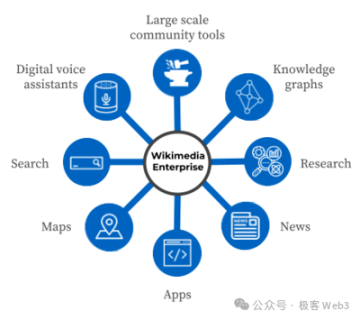
The Foundation also operates a Wikimedia online store (store.wikimedia.org), which sells peripheral merchandise with the Wikipedia logo, such as T-shirts, mugs, and stickers. Although this part of the income accounts for a relatively small proportion, it is also one of the supplementary sources of income for the Foundation, bringing in about several hundred thousand dollars of additional income each year.
In addition to the stable sources of funds explicitly mentioned above, we can also see from the balance sheet that the Wikimedia Foundation also participates in some investment activities. In 2023, the Wikimedia Foundation made a profit of about 6.5 million US dollars from its investment, but in 2022, its investment activities lost more than 11 million US dollars.
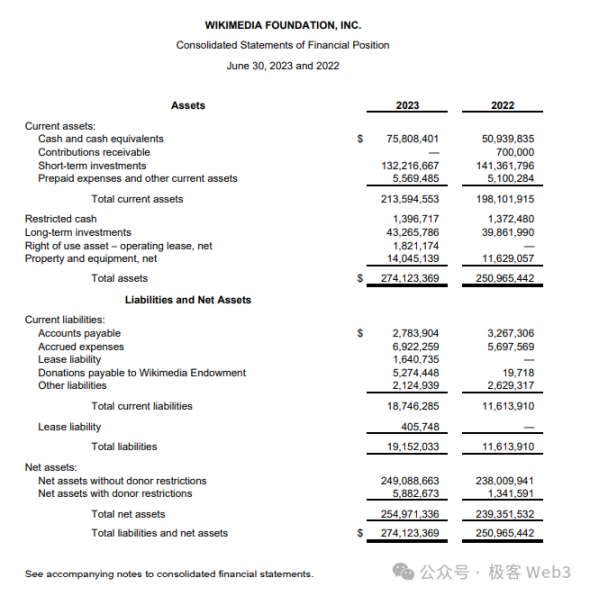
Expenditure allocation
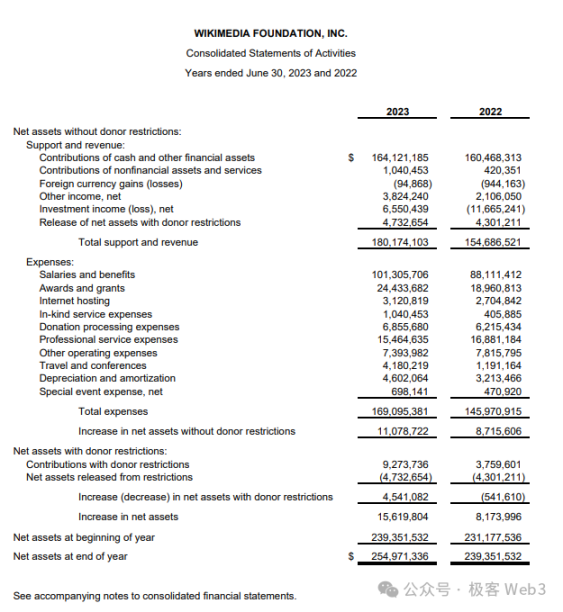
The Wikimedia Foundation has detailed budget planning and financial audits for all fund use. Every major expenditure is subject to multiple approvals to ensure rationality and transparency. The Wikimedia Foundation's financial reports are also made public regularly to let donors and the public know the specific use of funds.
According to the Wikipedia Foundation's financial statements, we can see its specific expenditure situation. In fiscal year 2022 alone, its expenditure reached US$169 million, of which employee salaries and benefits accounted for 60% of the expenditure. This money is mainly used to pay the salaries and related benefits of technical teams and community personnel, covering expenses for server maintenance, software updates, data security and other work.
As the world's largest online encyclopedia, Wikipedia needs to handle huge amounts of data and traffic. Just maintaining and upgrading technical resources such as servers and data centers is a huge expense. As of 2024, Wikipedia has built 6 data centers around the world, located in the United States, the Netherlands, France, and Singapore to ensure the stable operation of Wikipedia and other Wikimedia projects.
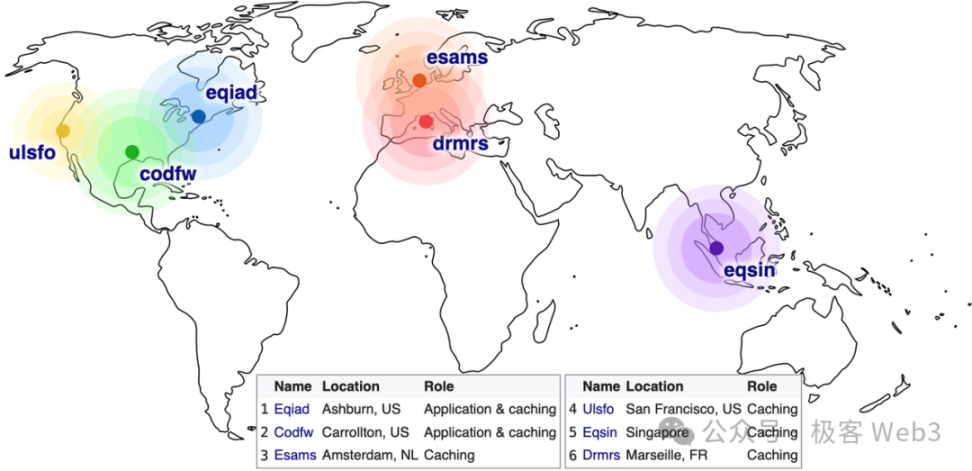
At the same time, Wikipedia cannot do without the support of the global volunteer community. The Wikipedia Foundation provides various awards and funding activities around the world to promote community building, which accounts for about 14% of the expenditure. For example, the Wikipedia Foundation has organized "Edit Marathon" activities in some regions to encourage volunteers to focus on editing specific subject entries to expand the breadth and depth of content. Typical cases include the "Fashion Edit-a-thons" held in many countries, mainly in France, and the "Wiki4Climate" event focusing on climate in 2020.
In addition, the Wikipedia Foundation has invested a lot of resources in professional services, including legal advice, external technical support and accounting audits, to ensure the compliance and operational security of Wikipedia around the world.
At the same time, the foundation's administrative expenses also cover the rental of office facilities and daily management expenses to maintain internal operations, and regularly hold technical seminars and international editorial meetings to promote cooperation and exchanges among the global volunteer community, which also requires financial support.
The above two parts together account for 15% of the total expenditure. In addition, the Wikimedia Foundation's fundraising activities in the society through advertising and payment channels account for 4% of the total expenditure.
Wikipedia's Challenges: Donation Fraud, Corruption, and Political Correctness
The sustainable development of any public good is an issue that cannot be ignored. It is undeniable that Wikipedia has done well in this regard in the past, but it still faces hidden dangers and challenges. First, Wikipedia's operating funds mainly rely on user donations. Although this model has maintained the development of the platform, its non-autonomous economic source is still extremely unstable. Under the impact of the large language model, users' willingness to donate to Wikipedia is more easily affected.
Secondly, as a non-profit organization, if the foundation attempts to increase revenue through typical commercial means such as paid APIs, it may trigger controversy about the nature and neutrality of the platform. In this way, the instability of Wikipedia's economic sources and neutrality has become a chronic disease, and there is a question that cannot be ignored.
As the saying goes, "a tall tree attracts the wind." Wikipedia has obtained such a huge source of income through donations alone, which has caused a lot of dissatisfaction from the outside world. The destination of its funds is quite controversial, and similar rumors such as "over-subscription" and "donation fraud" seem to have never subsided. On the one hand, Wikipedia's fundraising copy sometimes exaggerates the urgency of its funding needs, and even gives people the impression that Wikipedia is "about to go bankrupt," causing users to misunderstand the financial situation of the platform.
On the other hand, some insiders provided specific data, indicating that the operation of Wikipedia does not require so much money, and there is a great suspicion of "public enrichment".
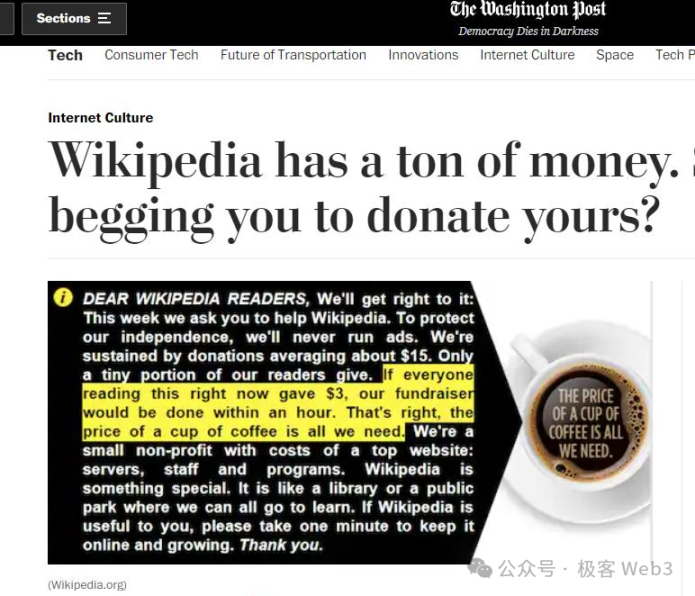
Kolbe, former co-editor of the Wikipedia community newspaper, said that he was very familiar with the internal operations of Wikipedia. The donation fund plan launched by the Wikipedia Foundation in 2016 originally planned to complete the fundraising target of 100 million within 10 years. However, the density of fundraising activities and fundraising advertisements has increased significantly recently, and the fundraising scale several times of this can be completed at least 5 years in advance. In contrast, Wikipedia only needs 10 million US dollars per year to operate normally.
Felipe da Fonseca, a Brazilian editor, once said: "Using other people's work to ask for money is a beggar-like posture. It is too ugly and immoral."
Wikipedia founder Jimmy Wales has also been frequently accused by the community, with many believing that the cost/benefit ratio of the Wikimedia Foundation is tragic, with the foundation spending millions of dollars on software development over the years without producing anything effective. Wales admitted in 2014 that he was frustrated by the endless controversy, which accused him of wasting money on developing software with no real value without adequate community consultation and without proper incremental promotion to make up for the mistakes.
In February 2017, The Signpost published a column titled "Wikipedia Has Cancer", in which the author criticized the Wikimedia Foundation for its increasing annual expenditures without achieving corresponding output results.
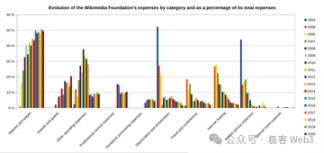
Musk is also a staunch critic of Wikipedia. In 2023, Musk changed the name of Twitter to "X", which attracted a lot of discussion. At this time, Musk made a post joking: If Wikipedia changes its name from "Wikipedia" to "Dickipedia" for one year, he will immediately donate $1 billion to the Wikipedia Foundation to express his dissatisfaction with Wikipedia's call for donations and rumors of over-funding. Later, Musk also made remarks such as "Wikipedia is broken" and "Wikipedia is losing its objectivity", which are not listed one by one in this article.

Musk's remarks may contain some political factors (many entries on Wikipedia have a clear anti-Trump tendency), which we will not discuss, but it does represent the negative attitude of many well-known figures towards Wikipedia.
In response to such rumors, the Wikipedia Foundation explained that the funds raised are not only used for daily operations, but also ensure that Wikipedia has sufficient reserves to cope with potential crises under the premise of being ad-free, free to read and not affected by commercial interests. This fund management strategy can enhance its fault tolerance and help Wikipedia maintain the independence and stability of a non-profit public good.
In addition to the above problems, there are many other problems in the development of Wikipedia.
First, as an open editing platform, Wikipedia's content relies on volunteers around the world to create and maintain it. Although this model encourages broad participation, it also leads to misleading, inaccurate, and even malicious modifications. Although the platform has strict editing rules and review mechanisms, how to ensure the reliability and neutrality of content in the AI era and correct errors in a timely manner will be a challenge that cannot be ignored in its development process.
At the same time, through some third-party data, we can find that although the number of Wikipedia users is increasing year by year, the number of active editors on the platform has decreased significantly in recent years. There are two main reasons for this phenomenon:
- Wikipedia's review mechanism is becoming increasingly strict, discouraging new editors
- Administrators have more and more privileges, and can block some editors' accounts and IP addresses, which may lead to abuse of power.
In addition, the management is not monolithic. In particular, there are many differences between the Wikipedia community and the Wikipedia Foundation, which were once brought to the surface and even involved issues of corruption and abuse of power by the management.
In 2014, the Wikimedia Foundation tried to install a new software for viewing multimedia content on the German version of Wikipedia, and the German editors of Wikipedia refused to update the user interface, and the two sides were deadlocked. In the end, the Wikimedia Foundation forced the installation of the new software and set high-level permissions to prevent editors from rolling back to the old version.
On September 13, 2021, the Wikimedia Foundation also launched an action against the Chinese Wikipedia, resulting in the banning of 7 users and the removal of the permissions of 12 administrators. Among them, three users were in the top ten in terms of activity on the Chinese Wikipedia. Since the Wikimedia Foundation did not provide systematic and detailed evidence or explanation for the incident afterwards, the incident was considered by the Wikipedia community and Chinese media in mainland China to be suspected of excessive interference in the autonomy of the community and suppression of those who hold hostile Western ideologies. And there is a lack of procedural justice.
In addition, on issues related to resource allocation, such as the allocation of funds between different language versions, the cost setting for developing software and maintaining infrastructure, investment in different regions, etc., the Wikipedia community and the foundation have actually been competing with each other for dominance.
As a public good, Wikipedia relies on its credibility to obtain donations for its continued operation, and this credibility is maintained by the authority and comprehensiveness of its content, as well as the decentralized distribution of power between the community and the foundation. The above-mentioned infighting that has been made public is a destruction of its credibility. Coupled with the impact of large language models such as AI, the quality of Wikipedia's entries and the scale of its users may experience an irreversible decline, leading to a further reduction in its credibility.
At the same time, Wikipedia is also facing the problem of insufficient diversity of volunteers. For example, content about women, ethnic minorities and non-English-speaking cultures is often neglected. How to attract more volunteers and encourage people from different backgrounds and regions to participate is another key to the future development of the platform.
Summarize
The success of Wikipedia lies not only in its outstanding achievements as a knowledge sharing platform, but also in the valuable thinking it provides for the sustainable development of public goods. As the world's largest open encyclopedia, Wikipedia does not use commercial means as a profit-making method, and tries to maintain content neutrality, successfully responding to the challenges of the Internet era, which has far-reaching implications for the management of other public goods.
The history of Wikipedia shows that only through stable economic sources, efficient use of funds, transparent financial management and deep community participation can public goods move forward steadily in the long run. At the same time, we must also see that the operation of Wikipedia is not perfect, whether in terms of finance, organization or public opinion. There are many problems, which have attracted controversy that cannot be ignored. The lessons of the past are a lesson for the future. These problems undoubtedly have a strong warning effect on the builders of other public goods.
In the future, the sustainable development of public goods will face more complex environmental changes, including the distraction of user attention and the sharp increase in operating costs caused by the impact of fragmented self-media, as well as the adjustment of laws and regulations around the world and the continuous evolution of user needs. This means that public goods must not only continue to attract user participation, but also actively explore more sources of income to open up a steady and sustainable development path.
References
1.Wikipedia from Wikipedia
2.Wikimedia Foundation from Wikipedia
3.Wikimedia Foundation reports/Financial/Audits/2022-2023 - frequently asked questions
4.Wikimedia Foundation 2021-2022 Annual Report
5.Reading Wikipedia in the Classroom
6.Foundation launches Wikimedia Enterprise: the new, opt-in product for companies and organizations to easily reuse content from Wikipedia and Wikimedia projects
7.Wikipedia:Administrators from Wikipedia
8.The Wikipedia Revolution: How a Bunch of Nobodies Created the World's Greatest Encyclopedia
9.Annual Report 2022-2023-The humans behind a year of impact around the world
10.WIKIMEDIA FOUNDATION,INC.Consolidated Financial Statements
11.Commons:Fashion Edit-a-thons from Wikipedia
12. Edit-a-thon from Wikipedia
13.https://www.nytimes.com/2023/07/18/magazine/wikipedia-ai-chatgpt.html
14.https://www.pingwest.com/a/244154












